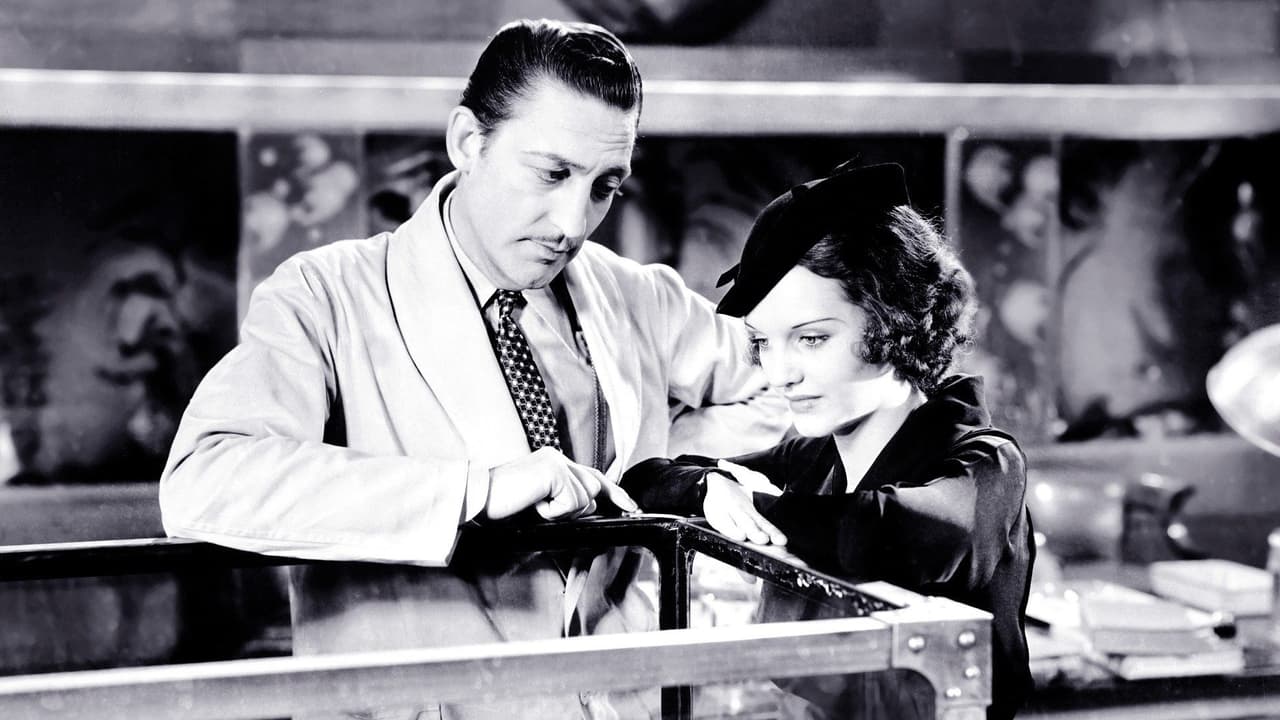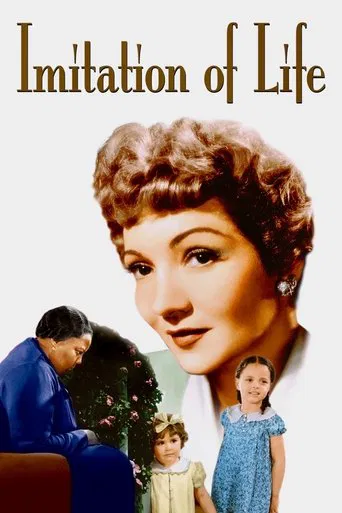

I saw the remake years ago. I liked it, but not enough to watch it again. I didn't know there was an original, and stumbled upon it by accident. I was so glad I did. I read others reviews about it being racist, but this was in 1934. Obviously, today this movie wouldn't be relevant, but 83 years ago, I think it was realistic for Delilah to want her life to be the same. When she's told she's made enough money to buy her own house, and a car, she tells Bea not to send her away. She explains she's her cook, and wants to stay her cook, (In real life, Louise Beavers hated to cook) and she only wanted money for her funeral. It was very heartwarming, and probably the most touching movie I've seen in years. Even though Louise Beavers was credited 4th, she was the star. She was so kind, selfless, never complained, and always put everyone before herself. The two women, Delilah and Bea, formed a friendship that spanned 15 years. Together, they built a business that became very successful. I was intrigued by Elmer's million dollar idea, with only two words, "Box it." But, the daughters of two women, brought emotional, and heartbreaking issues to the second half of the movie. I felt so bad for Delilah, and then for her daughter who realized too late, how sorry she was for being ashamed of her mother. Movies don't make me cry, but this one had me in tears. Not so much for Bea's issues with her daughter; but, from the heartbroken Delilah, after her daughter told her she leaving. And how she didn't want anyone to know she was her daughter. Nothing could have been more painful than that, and her death was proof that a you can die from that kind of pain. Watch it with the mindset it was written in, as well as the year. It's emotional, but worth watching. It also makes you appreciate the issues people had to deal with then, aren't at all issues of today.
... View MoreI was amazed to learn that there was another version of "Imitation of Life", quite different from the one done in the 50's. Forever, I claimed the Lana Turner version as one of my favorite movies until I saw the original classic done in1934 with Claudette Colbert, handsome Warren Williams and Louise Beaver playing Delilah Johnson.The dedication and loyalty Ms. Beaver showed for her employer was so genuine and touching but, on the flip side, it also showed how naive she was about securing her own future. I immediately associated this film with the story of Aunt Jemima, since that title is synonymous with the "Mammy prototype" which can be categorized as a black female servant who is extremely protective of her white employer and feels she must take care of her. Miss Colbert, on the other hand, displayed admiral qualities since she insisted that Ms. Beaver profit from her labor.I think minorities would appreciate this version more than the latter because the "lessons learned" would have more significance.Great Storyline
... View MoreThis 1934 filmed version of the story, which is well written, acted and directed, is the one worth watching. The 1959 version, which is none of these things, has purely historical interest. And the historical interest is this: if these films are anything to go by, in the 25 years between them race relations and the filming-making craft in America both went into reverse. Concentrating on the treatment of race for a moment, while the rabbit's foot and the 'will to death' clichés about African Americans have gone out of the story by 1959, opportunities and recognition for their race are seemingly more elusive than before. The Annie character in the earlier film is a business partner (albeit an unequal one, a '20%er') of her white friend; in the latter version she is no more than her maid and occasional confidante. In the 1934 version, Annie's daughter conforms to the 'tragic mulatto' stereotype but retains personal dignity; in the 1959 version she conforms to the 'promiscuous mixed-blood' stereotype and ends in the gutter. Both scripts struggle to interconnect the relationship between the ambitious white woman and her daughter and the relationship of the black woman and her daughter, in terms of dramatic action, thematic content and comparative time on screen. Although the films place both relationships under the one roof, they run largely in parallel: problems of 'white folks' and problems of 'black folks' are perceived to be so separate. The latter version does worse in this regard. At least the 1934 version tries to bridge the gap by having the Claudette Colbert character go in search of the runaway Sarah Anne. Lana Turner's character just pitches in a few trite comments. This lack of emotional commitment robs the final scene in the 1959 film of any of the power that is present in the earlier version when Colbert goes to comfort Annie's daughter at the hearse. With its undistinguished supporting cast, a terrible score and sometimes laughable dialogue, the remake would, I suspect, have disappeared from critical discussion had it not for its 'controversial' subject-matter and the star pull of an aging Turner. The 1934 version still looks and feels somewhat brave; certainly it has a lot more heart and quality. The DVD's quality in sound and image are also good.
... View More117: Imitation of Life (1934) - released 11/26/1934, viewed 9/9/08.Cole Porter's 'Anything Goes' premieres in New York City.KEVIN: This surprising eleventh-hour addition to the list left me wondering what could possibly compel us to skip it in the first place. Claudette Colbert (playing Beatrice, in her third film this year) teams with Louise Beavers (as Delilah) in an absorbing drama about two very different single moms, their daughters, their successful pancake business, and a lifetime of friendship. At the center of the movie is the relationship between Delilah and her light-skinned daughter Peola (played by Fredi Washington as an adult, in pretty much the role she was born to play). The drama of this story is so powerful, that all the other subplots take a back seat, including the plot of Bea and her daughter Jessie (Rochelle Hudson) falling for the same man. This is the one film that dives in head first with the hard questions for which there are no easy answers. I would like to have seen more scenes between Jessie and Peola interacting as grown women. My only problem with Fredi Washington's performance was that it was hard for me to buy that she was 19 years old. Other than that, her performance is so gut-twistingly poignant that it was sometimes hard to watch.DOUG: A chance meeting between two single moms leads to a lifelong friendship in Imitation of Life, a movie that was a rather late addition to the Odyssey, but one I'm very glad we looked at. Not since Little Women have I seen a melodrama where everyone is so nice to each other. We've already seen Claudette Colbert in a wide variety of roles in a short amount of time: conniving Roman queen, scheming Egyptian queen, spoiled runaway heiress, and so forth. Here we get to see another side of her: loving, working mom. Louise Beavers as Delilah paves the way for African Americans in the cinema. The movie deals with a lot of dodgy territory for the mid-30's, and putting a black woman in a front-and-center supporting role is just the start of it. Delilah's daughter Peola (Fredi Washington as a teenager) is a mulatto, and deals with alienation at trying to relate to her black mother but preferring to pass as white. Contract Player Alert: Warren William joins Claudette on screen again after playing Caesar in DeMille's Cleopatra. Another welcome contract player is Ned Sparks (42nd Street and Gold Diggers of 1933), who plays a passing business man who helps put Bea on the right track. **SPOILER ALERT**Other dramas develop as Bea's daughter Jessie falls for Steve who is after Bea. After sizing up her daughter's interest in Steve, she begs him to keep his distance (she must have seen Mildred Pierce already). I will say this though: I've heard that most guys, when they grow up, fall for women similar to their mothers. If the reverse is true for girls, then Jessie falling for Steve kind of indicates that he's the right guy for Bea. **END SPOILER** Great performances and good drama attached to the script based on Fannie Hurst's novel lead to a high recommendation for this one.Last film: It's a Gift (1934). Next film: The Man Who Knew Too Much (1934).
... View More